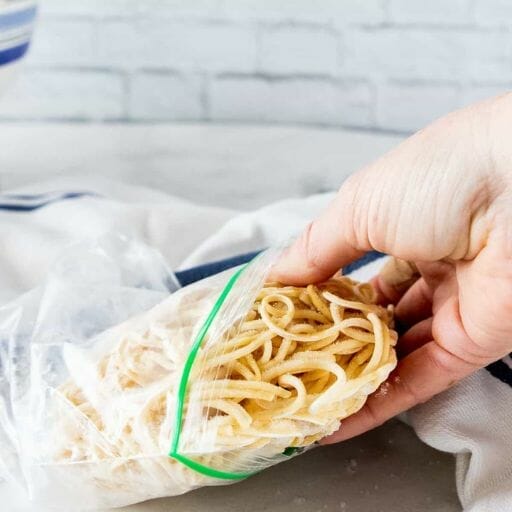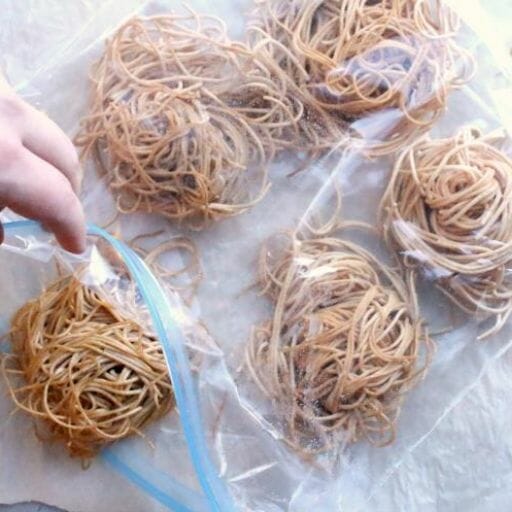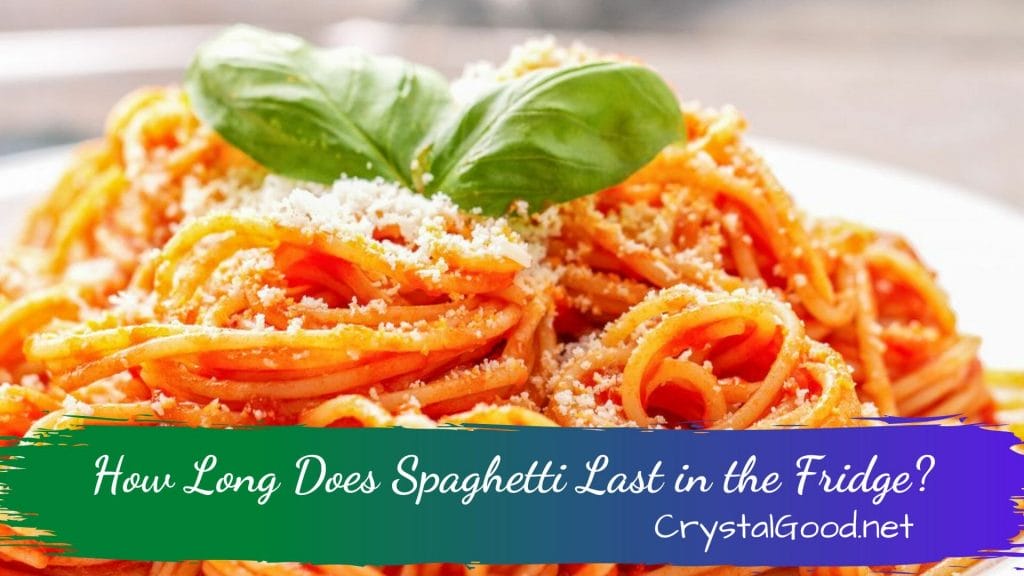Cooking up a big pot of spaghetti is always a great go-to dinner option since it’s so easy to make and doesn’t require too much time. However, if you’re like me, you may find yourself with leftovers that need to be stored away for future use. If this is the case for you, then one question may have crossed your mind: how long does spaghetti last in the fridge? In this blog post I’ll discuss the answer to this question as well as some key tips on storing spaghetti properly in order to keep it safe and maintain its freshness. Keep reading to learn more about proper storage for leftovers!
Is Spaghetti Healthy for You?
Contents
- 1 Is Spaghetti Healthy for You?
- 2 Can you Freeze Spaghetti?
- 3 How to Store Spaghetti?
- 4 What is the Shelf Life of Spaghetti?
- 5 Factors Affecting the Shelf Life of Spaghetti
- 6 Type of Spaghetti
- 7 Ingredients
- 8 Storage Temperature
- 9 Moisture Content
- 10 Packaging
- 11 How Long Does Spaghetti Last in the Fridge?
- 12 Shelf Life of Uncooked Spaghetti in the Fridge
- 13 Shelf Life of Cooked Spaghetti in the Fridge
- 14 Signs of Spoilage
- 15 Tips for Storing Spaghetti
- 16 Proper Storage Containers
- 17 Labeling
- 18 Ideal Storage Conditions
- 19 Freezing Spaghetti
- 20 Ways to Tell If Spaghetti Has Gone Bad
- 21 How do You Make a Quick and Easy Spaghetti Dinner?
- 22 What is the Best Way to Reheat Spaghetti?
- 23 How can I Make Leftover Spaghetti Taste Better?
- 24 How long Can You Store Spaghetti in the Pantry?
- 25 Conclusion: How Long Does Spaghetti Last in the Fridge
- 26 The FAQs about Storing Spaghetti Last in the Fridge
- 27 How long can uncooked spaghetti last in the fridge?
- 28 How long can cooked spaghetti last in the fridge?
- 29 Can I eat spaghetti that has been in the fridge for a week?
- 30 Can I freeze cooked spaghetti to extend its shelf life?
- 31 How can I store spaghetti to extend its shelf life?
- 32 Can I reheat refrigerated spaghetti?
- 33 Can spaghetti be stored in the fridge without an airtight container?
- 34 How can I tell if refrigerated spaghetti has gone bad?
- 35 How long can cooked spaghetti be left at room temperature before it spoils?
- 36 Can I store spaghetti sauce and spaghetti in the same container in the fridge?
- 37 Can I store spaghetti in a plastic bag in the fridge?
- 38 How can I prevent spaghetti from drying out in the fridge?
- 39 Can I eat refrigerated spaghetti that smells like garlic?
- 40 Can I store spaghetti in the fridge after it has been cooked with meat?
- 41 Can I store spaghetti in the fridge after it has been cooked with cheese?
Spaghetti is a grain food, containing more than 200 calories per cup. It contains complex carbohydrates and is considered a healthy food. It is also a good source of fiber. A serving of spaghetti also contains around 2.5 grams of protein, making it an excellent choice for those on a low-fat diet. However, those with gluten sensitivity may want to limit their intake.
While it can be high in calories, spaghetti is low in saturated fats. As a result, it is an excellent choice for people on a low-fat or low-carb diet. However, be aware that spaghetti contains gluten, which is a protein found in grains. People with gluten sensitivity or celiac disease should limit their intake of pasta.
While pasta is often regarded as a “bad food” for people with cardiovascular disease, a recent study found that pasta consumption can help lower the risk of cardiovascular disease, including heart disease. Researchers found that people who ate the most pasta were less likely to have ASCVD and heart disease. The study looked at postmenopausal women, so the results do not apply to the general population. Nevertheless, pasta is one of the most popular foods in the United States, with an average person eating about 20 pounds of it a year. This makes it the sixth most popular food item per capita in the nation.
Can you Freeze Spaghetti?

If you are cooking large quantities of pasta, it can be handy to freeze some in advance. This is particularly convenient if you are pressed for time or if you have a busy work schedule. You can also reheat frozen spaghetti in the microwave to use for a future meal. In general, spaghetti can last for about two to three months in the freezer.
To freeze spaghetti, you should first cool it to room temperature. This will prevent ice crystals from forming. Once the spaghetti is completely cooled, you can place it in a freezer bag or reusable plastic container. Then you can use it whenever you want it. If you want to reheat it later, be sure to coat the frozen spaghetti with olive oil.
Spaghetti with meat sauce can last up to 8 months in an airtight container. However, it is recommended that you use it within two months of freezing. The meat will retain its best quality after three months. If you are freezing a container of spaghetti for long-term storage, it is best to place it in the refrigerator overnight before freezing. You can also place the container in a large sink and run cold water over it to thaw it quickly.
How to Store Spaghetti?
Stored correctly, spaghetti will keep for up to four days in the fridge. However, it is best to check the spaghetti to make sure that it is still fresh before cooking it. Otherwise, it can go bad very quickly. To avoid this, store spaghetti in an airtight container. Refrigerating pasta at room temperature may cause bacteria to grow.
Spaghetti is one of those dishes that can be prepared in bulk, making it a convenient meal to have on hand. It is also easy to store and reheat. Just make sure you follow the following guidelines: First, make sure your spaghetti is completely dry before storing it. This way, it will keep fresh and retain its flavor.
When storing pasta, always keep the sauce separate from the pasta. This way, you can use the sauce in another recipe. If you store pasta in sauce, it may get soggy and lose its flavor over time. Stirring the spaghetti with the sauce, however, may make it taste better.
What is the Shelf Life of Spaghetti?
The shelf life of spaghetti depends on several factors, such as the storage conditions and whether the spaghetti is cooked or uncooked. Uncooked spaghetti can last up to one year if stored in an airtight container, while cooked spaghetti can last up to five days if stored in an airtight container. It is essential to check for signs of spoilage before consuming spaghetti to ensure that it is still safe to eat. Additionally, proper storage, such as using the right container, labeling, and storing spaghetti in ideal conditions, can significantly extend its shelf life.
Factors Affecting the Shelf Life of Spaghetti
Spaghetti is a popular type of pasta made from wheat flour and water. It’s a versatile ingredient that can be used in a variety of dishes, from classic spaghetti and meatballs to cold pasta salads. Proper storage is crucial to ensure that spaghetti stays fresh and safe to eat. The following factors can affect the shelf life of spaghetti:
Type of Spaghetti
The type of spaghetti can affect its shelf life. Freshly made spaghetti has a shorter shelf life than dried spaghetti, as it contains more moisture. Fresh spaghetti should be consumed within a few days of being made, while dried spaghetti can last for months.
Ingredients
The ingredients used to make spaghetti can also affect its shelf life. Spaghetti made from whole wheat flour may have a shorter shelf life than spaghetti made from refined flour. Additionally, spaghetti that contains eggs or other perishable ingredients may spoil faster than plain spaghetti.
Storage Temperature
The temperature at which spaghetti is stored can greatly affect its shelf life. Spaghetti should be stored in a cool, dry place away from direct sunlight. Ideally, the storage temperature should be between 50°F and 70°F (10°C and 21°C). If spaghetti is stored in temperatures that are too warm, it can spoil quickly.
Moisture Content
Moisture content is another important factor that can affect the shelf life of spaghetti. Spaghetti that is exposed to moisture can become moldy or develop bacteria, causing it to spoil. It is essential to keep spaghetti dry and free from moisture to extend its shelf life.
Packaging
The packaging used for spaghetti can also impact its shelf life. Spaghetti that is stored in packaging that is not airtight may become stale or absorb moisture from the environment, leading to spoilage. Proper packaging can help to maintain the quality and freshness of spaghetti.
In conclusion, the shelf life of spaghetti can be affected by several factors, including the type of spaghetti, ingredients, storage temperature, moisture content, and packaging. It is essential to consider these factors when storing spaghetti to ensure that it remains fresh and safe to eat. In the next section, we will discuss how long spaghetti can last in the fridge and how to identify signs of spoilage.
How Long Does Spaghetti Last in the Fridge?
Proper storage is crucial to ensure that spaghetti remains fresh and safe to eat. Refrigeration can significantly extend the shelf life of spaghetti, both cooked and uncooked. The following are the general guidelines for how long spaghetti can last in the fridge:
Shelf Life of Uncooked Spaghetti in the Fridge
Uncooked spaghetti can be stored in the fridge for up to one year if stored in an airtight container. If the spaghetti is opened and not stored in an airtight container, it can last up to six months in the fridge.
Shelf Life of Cooked Spaghetti in the Fridge
Cooked spaghetti can be stored in the fridge for up to five days if stored in an airtight container. It is important to cool the cooked spaghetti before placing it in the fridge. It is recommended to store the spaghetti and sauce separately to maintain the quality and freshness of both.
Signs of Spoilage
It is essential to know the signs of spoilage to ensure that spaghetti is still safe to eat. If spaghetti has an off odor, unusual color, or is slimy or mushy to the touch, it may have spoiled and should be discarded. Additionally, if there are any signs of mold on the spaghetti, it should be thrown away immediately.
Spaghetti can last for an extended period in the fridge if stored properly. Uncooked spaghetti can last up to one year, while cooked spaghetti can last up to five days. It is crucial to check for signs of spoilage before consuming spaghetti to ensure that it is still safe to eat. In the next section, we will provide some tips for storing spaghetti to help extend its shelf life.
Tips for Storing Spaghetti
Proper storage is essential to extend the shelf life of spaghetti and maintain its quality and freshness. The following tips can help to store spaghetti effectively:
Proper Storage Containers
Using the right storage container is crucial to keep spaghetti fresh. Spaghetti should be stored in an airtight container to prevent moisture, air, and contaminants from entering. Glass or plastic containers with a tight-fitting lid are ideal for storing spaghetti.
Labeling
Labeling is essential to ensure that spaghetti is consumed before it spoils. It is recommended to label the storage container with the date of storage to keep track of how long the spaghetti has been stored. This helps to avoid any confusion and ensures that the spaghetti is consumed before it spoils.
Ideal Storage Conditions
Spaghetti should be stored in a cool, dry place away from direct sunlight. The ideal storage temperature for spaghetti is between 50°F and 70°F (10°C and 21°C). It is also essential to keep spaghetti away from moisture to prevent mold growth.
Freezing Spaghetti
Freezing spaghetti is an excellent way to extend its shelf life. Uncooked spaghetti can be frozen for up to eight months, while cooked spaghetti can be frozen for up to three months. It is recommended to place the spaghetti in an airtight container or a freezer bag and remove as much air as possible before freezing.
Using the right storage container, labeling, storing spaghetti in ideal conditions, and freezing it can significantly extend its shelf life. Proper storage not only helps to maintain the quality and freshness of spaghetti but also ensures that it is safe to eat. In the next section, we will provide a brief summary of the key points discussed in the article.
Eating refrigerated spaghetti can have both benefits and risks depending on several factors such as the storage conditions and length of time that the spaghetti has been in the fridge.
Benefits:
- Convenience: Refrigerated spaghetti is a quick and easy meal option, making it a convenient choice for busy individuals.
- Extended Shelf Life: Refrigeration can significantly extend the shelf life of spaghetti, making it a practical option for meal planning and reducing food waste.
- Retained Nutritional Value: Properly refrigerated spaghetti can retain its nutritional value, making it a healthy meal option.
Risks:
- Spoilage: If spaghetti is not stored properly, it can spoil quickly and become unsafe to eat, leading to the risk of foodborne illness.
- Quality Degradation: Over time, refrigerated spaghetti can become dry, hard, and lose its flavor, texture, and quality.
- Bacterial Growth: If spaghetti is not stored at the correct temperature or for an extended period, it can become a breeding ground for harmful bacteria such as listeria and salmonella.
Refrigerated spaghetti can be a convenient and practical meal option. However, it is crucial to store it properly and consume it within the recommended shelf life to avoid the risk of food spoilage and foodborne illness. It is also important to check for signs of spoilage before consuming refrigerated spaghetti to ensure that it is still safe to eat.
Ways to Tell If Spaghetti Has Gone Bad

It is crucial to check for signs of spoilage before consuming spaghetti to ensure that it is still safe to eat. The following are some ways to tell if spaghetti has gone bad:
- Smell: The first and most obvious way to tell if spaghetti has gone bad is to smell it. If the spaghetti has a sour, musty, or rancid smell, it is likely spoiled, and it should not be consumed.
- Appearance: Spoiled spaghetti may have a different appearance than fresh spaghetti. If the spaghetti appears discolored, slimy, or has visible mold growth, it is likely spoiled.
- Texture: Spoiled spaghetti may have a different texture than fresh spaghetti. If the spaghetti feels slimy or mushy, it may be a sign of spoilage.
- Taste: If the spaghetti tastes sour, metallic, or bitter, it may be a sign that it has gone bad.
- Expiration date: Check the expiration date of the spaghetti before consuming it. If the spaghetti has expired, it is recommended to discard it, even if there are no visible signs of spoilage.
In summary, it is important to check for signs of spoilage before consuming spaghetti to ensure that it is still safe to eat. If the spaghetti has a sour or rancid smell, appears discolored or slimy, has a different texture, tastes unusual, or has expired, it is recommended to discard it to avoid the risk of foodborne illness.
How do You Make a Quick and Easy Spaghetti Dinner?
If you’re short on time and want to make dinner quickly, try this simple recipe. This dish uses canned tomato sauce, garlic, oregano, and spaghetti to create a flavorful one-pot meal. You can also add meatballs and turkey to the mix for added protein and nutrients.
This recipe can be made in one pot or skillet. You can brown ground beef in a skillet with onions, then add the vegetables, such as mushrooms and green peppers, tomatoes, and juice. Once the ground beef is cooked, add the spaghetti and simmer for 15 minutes until the spaghetti is tender. Top it off with mozzarella cheese and you’ve got a delicious meal.
To add a more substantial flavor to your spaghetti, add mushrooms and garlic. Add 1 tablespoon of butter and saute the mushrooms for 5 minutes, then add the garlic and remaining 2 tablespoons of butter. Stir to combine. After the garlic and mushrooms have cooked, add the remaining ingredients and the parmesan. Stir well and serve.
What is the Best Way to Reheat Spaghetti?
Spaghetti has a long shelf life in the fridge. It can last for several weeks if you store it properly. The trick is to avoid overcooking it, because it will become mushy if left too long. When reheating, make sure to stir it occasionally to prevent it from drying out.
However, pasta’s shelf life varies according to the time it spent on the table, the type of sauce, and the age of your fridge. If you’re concerned about the quality of your spaghetti, it’s a good idea to buy an independent thermometer so that you can monitor its temperature. Then again, it’s a good gesture to give leftovers to your neighbor, too.
Spaghetti is safe to keep in the fridge for up to 7 days, but it won’t taste as good as it did when it was freshly made. You can also freeze cooked spaghetti for longer storage. If you’re worried about wasting money, you can freeze it in portions. But make sure to thaw the frozen spaghetti before cooking it. Otherwise, it might become soggy and you’ll be left with a mushy mess!
How can I Make Leftover Spaghetti Taste Better?

If you have leftover spaghetti, you may be wondering how to make it taste better. There are a couple of ways to improve the taste and appearance of leftover spaghetti. The first method is to spruce it up. This method will make it look and taste better, and it’s particularly good if you have leftover spaghetti in a tomato-based sauce.
Spaghetti can also be made into a soup. You can thicken it by adding parmesan cheese or tomato juice to it. Then, serve it hot or cold. Another great option is to add some croutons or fresh mozzarella cheese to it before serving. This way, you get the best texture and flavor from your leftover pasta.
If you want to reheat leftover spaghetti, you can boil it in a pot of salted water. To do this, you can use a metal strainer or dip it in hot water. This will prevent the spaghetti from drying out and becoming mushy.
How long Can You Store Spaghetti in the Pantry?
The shelf life of spaghetti depends on its sauce and other ingredients. If you’re using homemade spaghetti sauce, it can last up to four days, and if you don’t use it right away, it will keep for six months. If you’re using store bought sauce, it can be stored for a month or more.
However, cooked pasta has a shorter shelf life, especially when it’s mixed with sauce. Using a container that seals well can help to extend the life of spaghetti. While plain spaghetti can be stored for a few days, pasta containing meatballs and other meat will spoil more quickly.
If you’re freezing leftovers, make sure to store them in an airtight freezer bag or shallow storage container. This will help the pasta cool down faster and prevent bacteria from forming. The spaghetti should be thrown out if it has been left out of the fridge for more than two hours. Otherwise, it will be soft and mushy.
Conclusion: How Long Does Spaghetti Last in the Fridge
You can extend the shelf life of your spaghetti by storing it in the freezer. Just be sure to keep it out of direct sunlight and away from strong smells. If you follow these simple storage guidelines, your spaghetti should stay fresh for 5 days. However, if you change your diet, it’s important to adjust the expiration date accordingly. By following these tips, you can enjoy delicious and healthy spaghetti dinners for many months to come!
The FAQs about Storing Spaghetti Last in the Fridge
How long can uncooked spaghetti last in the fridge?
Uncooked spaghetti can last up to one year if stored in an airtight container in the fridge.
How long can cooked spaghetti last in the fridge?
Cooked spaghetti can last up to five days if stored in an airtight container in the fridge.
Can I eat spaghetti that has been in the fridge for a week?
It is not recommended to eat spaghetti that has been in the fridge for a week as it may have spoiled, leading to the risk of foodborne illness.
Can I freeze cooked spaghetti to extend its shelf life?
Yes, cooked spaghetti can be frozen to extend its shelf life for up to two months.
How can I store spaghetti to extend its shelf life?
Spaghetti can be stored in an airtight container in the fridge or freezer to extend its shelf life.
Can I reheat refrigerated spaghetti?
Yes, refrigerated spaghetti can be reheated by heating it in a microwave or on a stovetop.
Can spaghetti be stored in the fridge without an airtight container?
It is not recommended to store spaghetti in the fridge without an airtight container as it can lead to spoilage.
How can I tell if refrigerated spaghetti has gone bad?
Signs of spoilage in refrigerated spaghetti include a sour or rancid smell, slimy texture, discolored appearance, mold growth, and unusual taste.
How long can cooked spaghetti be left at room temperature before it spoils?
Cooked spaghetti should not be left at room temperature for more than two hours to avoid spoilage.
Can I store spaghetti sauce and spaghetti in the same container in the fridge?
It is not recommended to store spaghetti sauce and spaghetti in the same container in the fridge as it can lead to spoilage and affect the taste.
Can I store spaghetti in a plastic bag in the fridge?
While plastic bags can be used to store spaghetti in the fridge, it is recommended to use an airtight container to avoid spoilage.
How can I prevent spaghetti from drying out in the fridge?
To prevent spaghetti from drying out in the fridge, store it in an airtight container with some olive oil or sauce.
Can I eat refrigerated spaghetti that smells like garlic?
If the refrigerated spaghetti smells like garlic, it is likely safe to eat. However, it is recommended to check for signs of spoilage before consuming it.
Can I store spaghetti in the fridge after it has been cooked with meat?
Yes, you can store spaghetti in the fridge after it has been cooked with meat. However, it is recommended to consume it within two days to avoid spoilage.
Can I store spaghetti in the fridge after it has been cooked with cheese?
Yes, you can store spaghetti in the fridge after it has been cooked with cheese. However, it may become dry and lose its texture over time.













